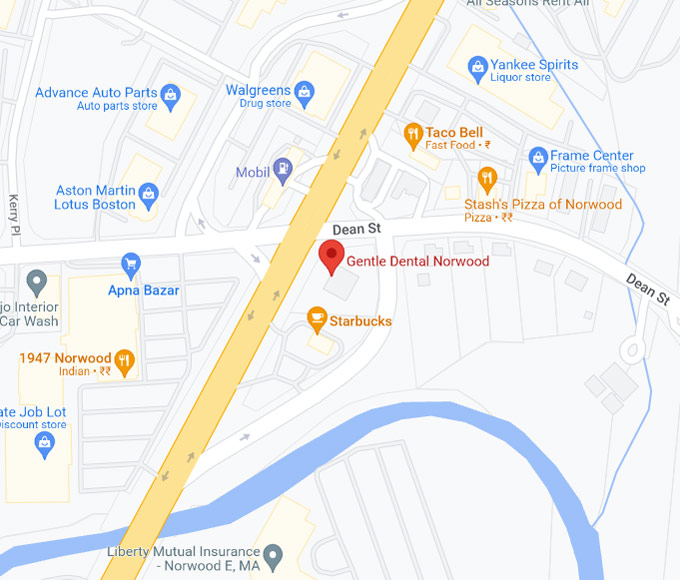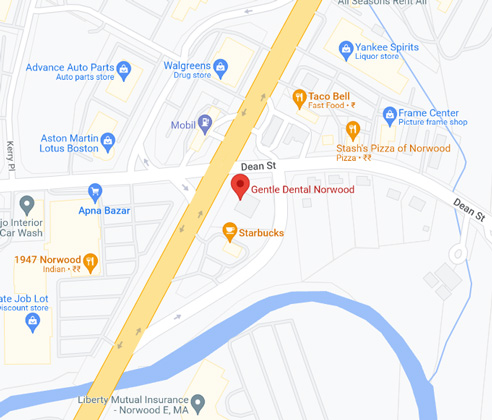- Locations
- Locations
- Arlington
- Attleboro
- Belmont
- Beverly
- Boston
- Braintree
- Brockton
- Brookline
- Burlington
- Cambridge
- Chelmsford
- Concord, NH
- Derry, NH
- Exeter, NH
- Franklin
- Hanover
- Hudson
- Keene, NH
- Malden
- Manchester, NH
- Medford
- Methuen
- Milford
- Nashua, NH
- Natick
- New Bedford
- North Andover
- Norwood
- Peabody
- Quincy
- Rochester, NH
- Saugus
- Seekonk
- Somerville
- Stoughton
- Wakefield
- Waltham
- Worcester
- Dental Services

Orthodontics in Norwood, MA
Transform your smile and oral health with the expertise of an orthodontist at Gentle Dental Norwood. We offer specialized care to improve teeth alignment and oral health, providing treatments tailored to your needs. Schedule your consultation today!
Dental Office Hours
Monday 9:00 AM - 5:00 PM
Tuesday 9:00 AM - 5:00 PM
Wednesday 9:00 AM - 5:00 PM
Thursday 9:00 AM - 5:00 PM
Friday 9:00 AM - 3:00 PM
Saturday 9:00 AM - 3:00 PM Once a Month
Sunday CLOSED
More Information
Dedicated parking lot available on-site.
Dental Office Hours
Monday 9:00 AM - 5:00 PM
Tuesday 9:00 AM - 5:00 PM
Wednesday 9:00 AM - 5:00 PM
Thursday 9:00 AM - 5:00 PM
Friday 9:00 AM - 3:00 PM
Saturday 9:00 AM - 3:00 PM Once a Month
Sunday CLOSED
More Information
Dedicated parking lot available on-site.
Gentle Dental Norwood Reviews
The dentist is never fun but they make it easy. Saran at the front desk was super nice and helpful. I had a walk in wisdom tooth removal with little to no pain at all. All the doctors and staff were great. They really care about their patients.
I have been going to the Norwood location for 1 1/2 years. Not only is it a convenient location, the staff is amazing! From the front office to the hygienists and the dentists, they are top-notch!!
They offer a $57 new patient offer and a choice of dental plans. Amazing values!
I hope you check them out!!Dental Services In Norwood
In addition to expert orthodontic care, our Norwood office offers a full range of dental services. From routine check-ups to advanced treatments, our orthodontist in Norwood and dedicated team are committed to meeting all your oral health needs. Experience exceptional care personalized for you.
Preventive Care
Restorative Care
Crowns and Bridges
Dental Fillings
Extractions
Gum Treatments
Implants
Partial and Full Dentures
Root Canals
Wisdom Teeth Extractions
Orthodontics
Additional Services
What Does Orthodontics Involve?
Orthodontics is a specialized field of dentistry that focuses on diagnosing and treating "bad bites" (malocclusion). Common treatments an orthodontist provides include braces, clear aligners, and retainers.
How your teeth align plays a crucial role in your overall oral health. By improving how your upper and lower teeth fit together, a skilled Norwood orthodontist can help reduce the risk of various dental issues, such as cavities, gum disease, and excessive wear (erosion).
Who Provides Orthodontic Treatment?
Orthodontists typically provide orthodontic treatments. Dental specialists undergo two to three years of additional training after dental school, focusing on improving bite alignment. Unlike general dentists, orthodontists do not perform treatments like fillings, crowns, or bridges.
Common Issues Treated By Orthodontics
Common orthodontic problems include:
- Overbite, where the upper teeth protrude over the lower teeth.
- Underbite, where the lower teeth extend beyond the upper teeth.
- Overlapping teeth.
- Crowded teeth.
- Crooked teeth.
- Rotated teeth.
- Impacted teeth, which are partially or fully trapped within the jawbone.
A skilled orthodontist can help diagnose and treat these issues to improve your bite and overall oral health.
Who May Not Be A Candidate For Orthodontic Treatment?
To be eligible for orthodontic treatment, you should not have serious dental issues, such as extensive decay or gum disease. Applying braces to teeth affected by these conditions can significantly harm oral health.
If you have cavities or gum disease, it's essential to consult with a dentist for treatment. Once these issues are addressed, speak with an orthodontist in Norwood, MA, to determine if orthodontic treatment is proper for you.
What Are Some Examples Of Orthodontic Treatments?
Orthodontics offers a variety of treatments designed to improve dental alignment and overall oral health. Some of the most common treatments include:
Braces
Braces use a combination of brackets, bands, and wires to shift teeth into the desired position gradually. Depending on your needs, different braces are available, such as traditional metal braces or clear (ceramic) braces.Clear Aligners
Clear aligners, such as Invisalign® and ClearCorrect®, are a popular alternative to traditional braces. These systems involve a series of custom-made, clear trays that gradually move your teeth into alignment. You wear each set of aligners for one to two weeks before switching to the next in the series.Retainers
After completing treatment with braces or clear aligners, a retainer is used to maintain the new position of your teeth. This custom appliance prevents your teeth from shifting back to their original position. Your orthodontist will guide you on how often to wear the retainer to preserve your results.Palate Expanders
A palate expander may be recommended in some cases, especially for children. This device helps widen the upper jaw, creating more space without tooth extractions. It's a practical solution when facial bones are still developing.What Are The Benefits Of Orthodontic Treatment?
Orthodontics offers more than just cosmetic benefits; it also provides significant functional and health advantages:
- When properly aligned, your teeth are much easier to clean, reducing the risk of plaque buildup.
- Straightening your teeth can improve chewing and speech function.
- Orthodontic treatment can help relieve pain caused by TMJ disorder.
- An aligned bite lowers the risk of cavities, gum disease, and other oral health issues.
With the help of an experienced orthodontist in Norwood, MA, you can achieve and maintain a beautiful, healthy smile.
What Are The Potential Drawbacks Of Orthodontic Treatment?
The main disadvantage of orthodontic treatment is the short-term commitment required. You must follow treatment guidelines carefully and be patient while working towards your desired results. For some, treatment may take less than a year, while for others, it could extend up to two years or longer. Treatment times vary based on individual needs, so asking your orthodontist what to expect is essential.
Additionally, if you don't clean around your orthodontic appliances thoroughly, you may be at a higher risk of developing cavities. Following your orthodontist's oral hygiene recommendations is crucial to maintain good dental health throughout treatment.
How Long Will The Results Of My Orthodontic Treatment Last?
If you follow your orthodontist's instructions and wear your retainer as directed, your results should last a lifetime. However, if you stop wearing your retainer, your teeth may gradually return to their original positions. To ensure long-lasting results, consult an orthodontist for proper guidance.
Frequently Asked Questions
What distinguishes a dentist from an orthodontist?
While dentists and orthodontists play essential roles in oral healthcare, the two have key differences. Dentists diagnose and treat tooth decay, gum disease, bad breath, and other common dental problems. They can also perform procedures such as taking dental X-rays, filling cavities, treating gum disease, and prescribing medication.
On the other hand, an orthodontist is a dental specialist who, in addition to performing many of the same tasks as a general dentist, is specifically trained to focus on the alignment of your teeth and jaw. If you're searching for an orthodontist in Norwood, MA, ensure they are well-qualified to diagnose malocclusion and provide the proper treatment for your needs.
Is orthodontics the same as braces?
Orthodontic treatment provides a solution for achieving a healthy smile and enhancing oral function. While braces commonly address many dental issues, an orthodontist may recommend surgical orthodontics to correct more severe jaw misalignments.
What does orthodontic treatment include?
Orthodontics is a branch of dentistry that focuses on correcting abnormalities of the teeth and jaw. Orthodontic care, provided by a skilled orthodontist in Norwood, MA, involves using devices like braces to straighten teeth and address bite issues.
Do orthodontists perform cleanings?
Many assume regular cleanings aren't necessary while wearing braces or Invisalign, especially since they visit their orthodontist frequently. However, it's important to note that most Norwood orthodontists do not perform dental hygiene appointments at their practice.
Book an Appointment
If your request is a dental emergency, or you would like to call and schedule your dental appointment, contact information for our offices can be found here: Gentle Dental Locations. New patient offer not valid for emergency appointments.

